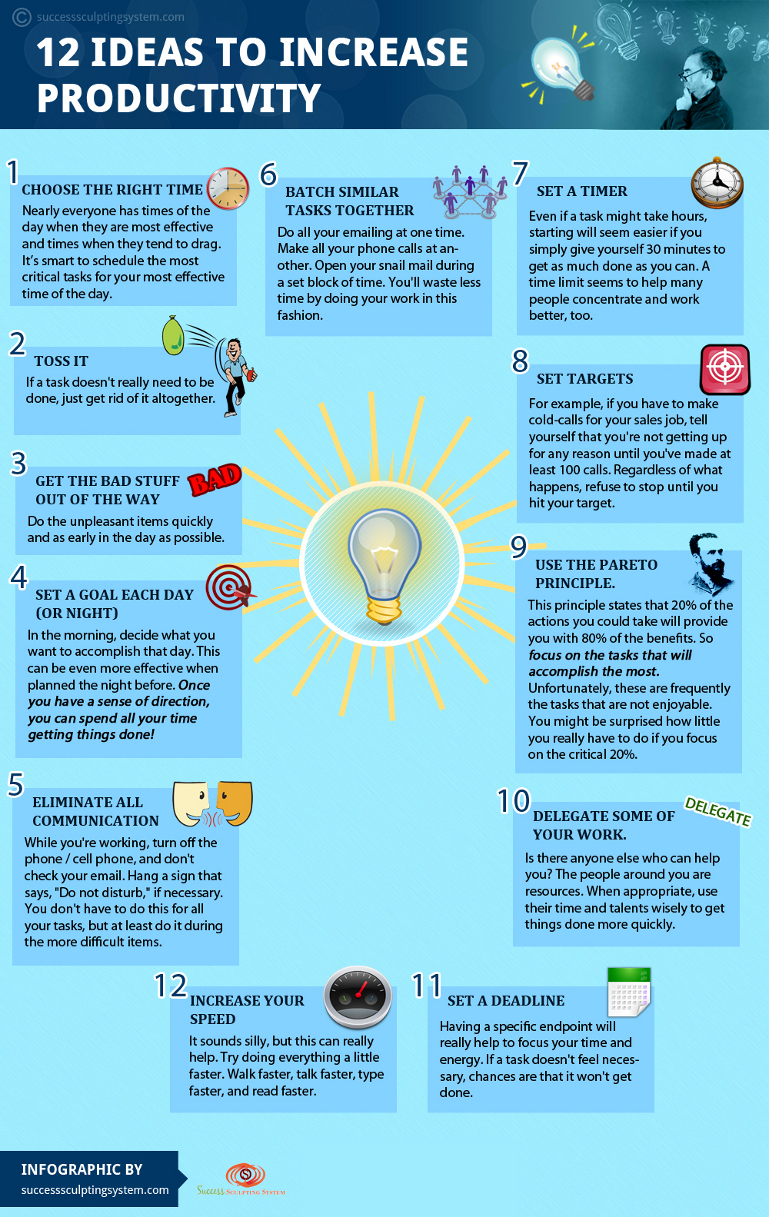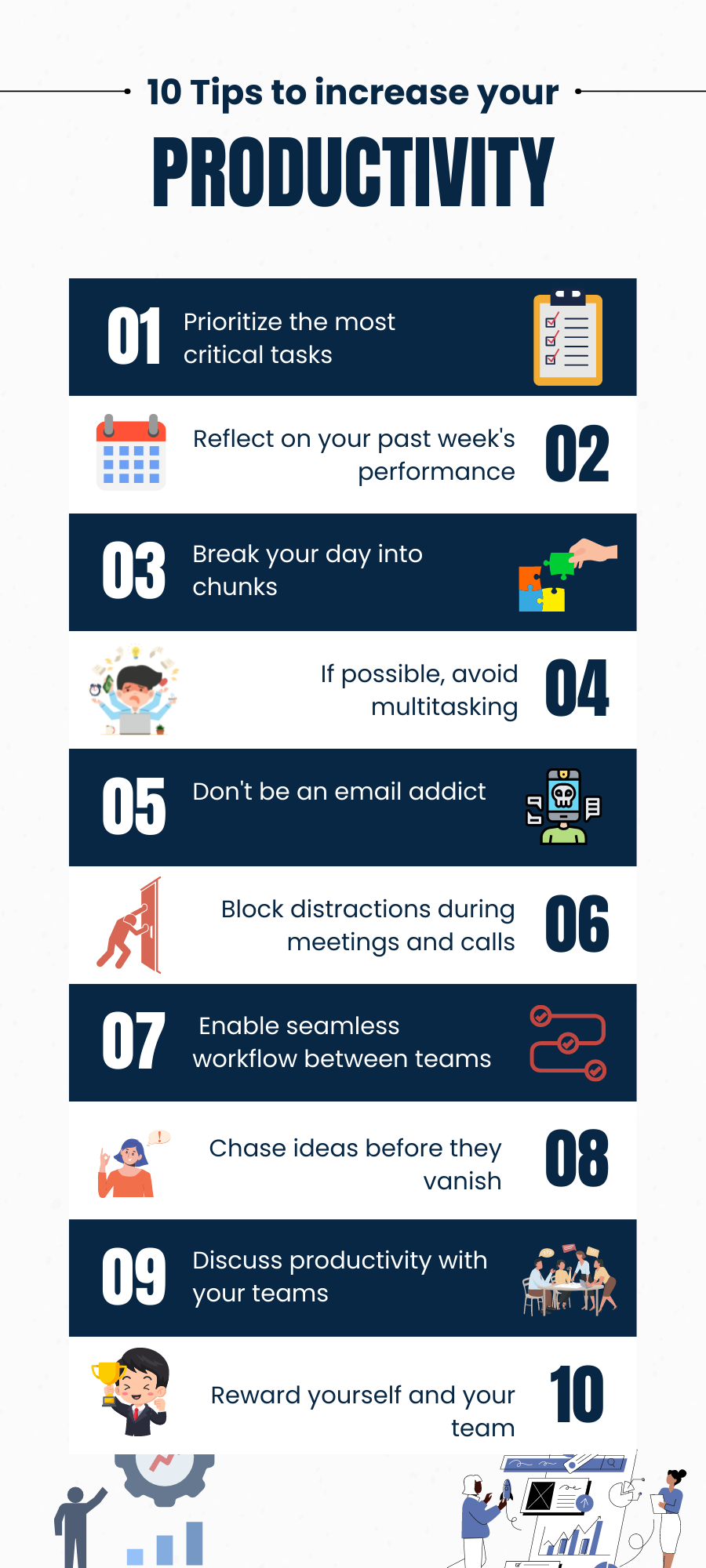
Work smarter, not harder

Time management is the need of the hour as it helps professionals strike a better work-life balance. Efficient planning and task management can maximize productivity as well. People can get more done in less time and accomplish all of their daily responsibilities quickly and effectively by setting up schedules and managing time. Here are a few tips and techniques that professionals can use to develop better time management skills.
1. Prioritize Tasks

Prioritization is assigning a level of importance to different tasks. To effectively manage time and get the important stuff done, tasks of higher importance should be done before the tasks of lower importance. Prioritizing requires a strong understanding of how long each job takes to complete. However, it takes time to become skilled at prioritizing responsibilities. Some like to get quick and easy tasks done first, but it is better to prioritize in order of importance for better output.
2. Analyze Productivity Patterns

Productivity is measured by output over a certain period. Everybody has different patterns of how productive they are throughout the day. While some are more efficient in the earlier hours of the day, others may not hit their productivity peak until after lunch. Thus, identifying the individual times of the day when a person is the most productive is important to maximize efficiency. Professionals should schedule faster or easier tasks during the less productive times, and keep the difficult tasks for when they are the most productive.
Read also:From Saturday Night Live To Only Murders In The Building Martin Shorts Journey And Net Worth
3. Avoid multitasking

Science suggests multitasking cuts efficiency and impacts productivity. While it might cost only a few seconds per switch, the time eventually adds up if people start multitasking frequently. Further, the risk of error also soars and the quality may drop as well. While multitasking seems like an effective strategy to accomplish multiple tasks more quickly, focusing on one assignment at a time can actually complete each task faster and with greater quality.
4. Leverage Time Management Tools

There are several productivity and automation tools that are designed to help professionals manage time. Time-tracking software can help professionals analyze how long it takes for them to complete individual tasks, and integrate it with their time-tracking results. Tools like Google/Outlook Calendar can be effectively used to schedule tasks and stay on top of daily, weekly, or monthly tasks/goals. Further tools like Lucidcharts can be used to create useful infographics and charts to track time, productivity, and tasks efficiently.
5. Manage Stress

Stress management is extremely important to keep productivity levels up and thus do more in less time. The ability to recognize personal stress levels can help professionals make better accommodations in their work schedules to keep the levels of stress low. Professionals can delegate tasks and take breaks accordingly when needed to stay focused and motivated. Like tasks breaks and other small activities can be scheduled effectively by professionals who understand their personal stressors. Scheduling tools can also be used to manage stress and take breaks.
6. Organize Your Desk

Professionals need to prepare their to-do lists every day and a piled-up desk and cluttered workspace can get in the way of executing tasks. If someone has piles of papers scattered all over their desk, finding the one that is particularly needed for a task can be difficult. Thus, valuable time is wasted looking for misplaced items on a disorganized desk. Simple things like a filing system for documents, unsubscribing to unwanted emails, and automating repetitive tasks or processes can go a long way in saving time.
7. Stick to a Schedule

Creating a daily schedule with allotted time for different tasks is the key to effective time management. Creating realistic timelines is also important as people often overestimate their capacity to get things done, which is known as the “planning fallacy.” This results in overly optimistic delivery estimates leading to more forfeitures. Professionals should also add time buffers between tasks to accommodate the ones that go over the time limit, to keep the overall schedule intact. Further to stick to a daily schedule, non-work-related tasks should be avoided during work hours.
8. Assign Time Limits to Tasks

Part of creating a daily schedule involves setting time limits on all the tasks instead of just working until they’re done. Here, the to-do lists are great, to set a steady pace of workflow. The Pomodoro Technique is very useful in this. In the technique, professionals check off their to-do list in 25-minute chunks, take short breaks between each stint, and then take a longer break after completing four chunks. This technique helps balance a schedule, reduce stress, and increase motivation.
Read also:Another 20 Trillion To Israel A Comprehensive Analysis
9. Tag Similar Tasks Together

A surprising amount of time and mental energy can be saved by completing similar tasks together in batches. Batching, or batch processing, is simply grouping similar tasks that can be worked together in the same chunk of time. They can be grouped by objective or function. For example, professionals can allot time for answering emails, making phone calls, and filing, instead of doing this as the emails and messages come in. This can help limit distractions and finish priority tasks better.
10. Remove Distractions

Social media, web browsing, co-workers, text messages, instant messaging, emails, client calls, spam calls, and more, can all be distractions at work which can eat away time. Thus, a key to saving time is being proactive about getting rid of all the possible distractions. Notifications should be shut off, all tabs that aren’t work-related should be closed and distracting tasks should be kept for later. This can be difficult at first thus it is recommended to take baby steps at the start.



